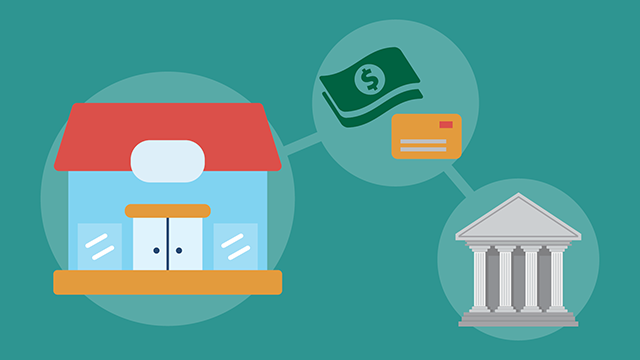Discover how Cash Loans can fill your immediate financial gaps
Wiki Article
A Comprehensive Overview to Home Loans: Solutions and Options Explained
Charting the world of mortgage can be complicated. Different options exist, each with unique functions and ramifications for prospective homeowners. Comprehending the differences between government-backed and traditional fundings is important. The application process involves careful documentation and pre-approval actions that numerous forget. As consumers commence on their home-buying trip, recognizing how to handle these responsibilities properly could imply the distinction in between financial stability and difficulty. What methods can equip them on this course?Recognizing Home Loans: Types and Terminology
Comprehending the various kinds of mortgage and their connected terms is vital for prospective homeowners, as it equips them with the expertise required to make informed financial decisions. Home mortgage can be broadly categorized into adjustable-rate and fixed-rate home loans. Fixed-rate home loans maintain a constant rate of interest price over the life of the financing, giving stability in monthly payments. On the other hand, adjustable-rate home mortgages include rate of interest that may vary after a preliminary fixed duration, possibly leading to reduced first settlements yet raised future expenses.Extra terms is necessary for quality. Principal describes the car loan amount obtained, while passion is the price of borrowing that quantity. The regard to the finance suggests its period, normally varying from 15 to 30 years. Understanding these essential principles allows potential purchasers to navigate the facility landscape of home financing, ensuring they pick the appropriate financing option that lines up with their financial scenario and lasting objectives.
Traditional Loans vs. Government-Backed Loans
A substantial distinction in home funding exists between traditional lendings and government-backed financings, each accommodating different customer requirements and scenarios. Conventional car loans are not insured or guaranteed by the federal government and typically call for greater credit ratings and down payments. They are commonly interesting debtors with stable financial backgrounds, as they might provide affordable rates of interest and terms.In contrast, government-backed finances, such as FHA, VA, and USDA financings, are created to assist certain teams of consumers, including novice property buyers and veterans. These financings typically feature lower deposit needs and even more adaptable credit standards, making them obtainable to a broader series of people.
Ultimately, the choice in between traditional and government-backed fundings depends upon the debtor's financial circumstance, long-lasting goals, and eligibility, making it vital to thoroughly evaluate both options prior to making a decision.
The Role of Rate Of Interest in Home Financing
Rates of interest play a vital function in home funding, affecting debtors' decisions between variable and fixed price lendings. The choice in between these alternatives can significantly impact monthly settlements, influencing overall cost. Comprehending exactly how rate of interest operate is crucial for any person maneuvering via the mortgage process.Repaired vs. Variable Prices
Property buyers face an important choice when picking between fixed and variable prices, as this choice greatly impacts the price of financing over time. Fixed-rate home loans provide security, securing a rates of interest for the life of the car loan, which can be useful in a rising passion rate setting. This predictability allows house owners to budget extra properly. Conversely, variable-rate home mortgages, or variable-rate mortgages (ARMs), typically start with reduced initial prices that can change based upon market conditions. While this may lead to reduced first repayments, consumers deal with the threat of boosted prices in the future. Ultimately, the option between variable and set prices relies on private financial situations, danger tolerance, and assumptions concerning future rates of interest trends.Influence On Regular Monthly Repayments
When evaluating home financing options, the effect of rates of interest on month-to-month repayments is a key variable to contemplate. Rates of interest straight affect the overall cost of borrowing, impacting just how a lot a debtor will pay monthly. A lower rates of interest outcomes in smaller sized regular monthly repayments, making homeownership much more cost effective. On the other hand, higher prices can significantly enhance monthly commitments, possibly straining a homeowner's budget plan. Additionally, the financing term plays an important duty; longer terms may spread payments out but can result in paying even more passion over time - Fast Cash. Understanding how passion rates communicate with finance quantities and terms is important for customers to make educated economic choices and pick a home mortgage that lines up with their long-term economic objectivesHome Loan Brokers vs. Direct Lenders: Which Is Right for You?
When taking into consideration a home loan, possible debtors must recognize the distinctive duties and obligations of mortgage brokers and direct loan providers. Each choice provides its very own advantages and downsides, which can considerably affect the total expense of financing. An informed selection calls for cautious analysis of these elements to figure out the finest fit for specific needs.Duties and Obligations Defined
Steering the complexities of home financing requires a clear understanding of the roles and responsibilities of mortgage brokers and straight lending institutions. Cash Advance. Home loan brokers function as intermediaries, linking borrowers with loan providers. They analyze a consumer's monetary circumstance, curate car loan options, and overview clients via the application procedure, frequently leveraging several lending institution partnerships to safeguard desirable terms. On the other hand, straight lenders, such as financial institutions and cooperative credit union, supply fundings directly to debtors. They handle the entire loan procedure, from application to funding, with a focus on their very own products. Each option provides distinct methods Get More Information for obtaining funding, making it necessary for borrowers to review their choices and requirements when determining in between engaging a home loan broker or dealing with a direct lenderAdvantages and disadvantages Contrast
Choosing between a home loan broker and a straight loan provider can significantly affect the home financing experience, as each alternative supplies special advantages and disadvantages. Home loan brokers act as middlemans, giving access to multiple lending institutions and potentially far better rates, while streamlining the loan procedure. They may bill fees and rely on payment frameworks that can affect their referrals. On the other hand, direct loan providers improve the procedure by using in-house car loans, which can lead to faster authorizations and less problems. Conversely, they may have a restricted option of items and much less flexibility regarding prices. Ultimately, the decision rests on private choices, monetary situations, and the desired level of support throughout the mortgage trip.Expense Implications Analyzed
While examining the price ramifications of mortgage brokers versus straight lending institutions, possible home owners should take into consideration various elements that can substantially impact their overall expenses. Home loan brokers commonly charge fees for their services, which can vary substantially, affecting the overall funding expense. Nonetheless, they frequently have access to a broader series of lending items and affordable prices, possibly conserving consumers cash in the lengthy run. On the other hand, direct lending institutions might offer a much more straightforward process with possibly reduced in advance prices, however their lending alternatives may be limited. It is crucial for homeowners to contrast rate of interest, fees, and terms from both brokers and lending institutions, ensuring they make an educated choice that aligns with their monetary goals and demands.The Mortgage Application Refine: What to Anticipate
The home mortgage application procedure can usually really feel intimidating for numerous applicants. It normally starts with gathering needed documents, including evidence of earnings, credit background, and individual recognition. Lenders use this information to analyze the applicant's economic security and determine finance qualification.Next, candidates send an official application, which may involve submitting on the internet types or supplying information in individual. During this phase, loan providers assess different elements, such as debt-to-income ratio and credit history, to pick car loan terms.
As soon as pre-approved, the lender will certainly perform an extensive assessment of the home to identify its value lines up with the car loan quantity. This stage might likewise include added history checks.
After last authorizations and conditions are met, the finance is processed, resulting in the closing stage. Understanding each step equips candidates, making the trip smoother and much more workable as they approach homeownership.
Tips for Managing Your Home Mortgage Sensibly
Successfully maneuvering the mortgage application procedure is simply the start of a responsible economic trip. Taking care of a home financing needs attention to a number of crucial techniques. First, borrowers ought to establish a clear spending plan that accommodates monthly mortgage payments, real estate tax, and insurance policy. Regularly assessing this spending plan assists click to read more stop overspending and assurances my link timely payments.
Additionally, making extra settlements when possible can significantly minimize the loan principal and total interest paid with time. Borrowers should also preserve open lines of interaction with their loan provider, especially in times of monetary trouble - Cash Loans. This can bring about possible options such as finance alterations or refinancing alternatives
Ultimately, it is suggested to check credit report frequently. An excellent credit rating can offer possibilities for far better finance terms in the future. By adhering to these ideas, home owners can browse their funding obligations successfully, guaranteeing long-lasting monetary health and wellness and security.
Regularly Asked Questions
What Are Closing Costs and Exactly How Are They Computed?
Closing prices encompass fees associated with settling a home loan, consisting of appraisal, title insurance, and financing source costs. These costs normally vary from 2% to 5% of the car loan quantity, varying based upon place and lending institution.
Can I Receive a Home Mortgage With Bad Credit?
Yes, people with poor credit history can get approved for a mortgage, though options might be limited. Lenders usually need greater deposits or rate of interest, and checking out government-backed lendings may enhance possibilities of authorization.
What Is Mortgage Insurance coverage and When Is It Called for?
Home mortgage insurance secures lenders against default and is generally called for when a debtor makes a deposit of less than 20%. It guarantees that loan providers recover losses if the borrower falls short to pay back the loan.Just How Does Refinancing Work and When Should I Consider It?
Refinancing entails replacing a current home loan with a brand-new one, normally to secure a lower rate of interest or change funding terms. Home owners need to consider refinancing when rate of interest drop significantly or their monetary circumstance enhances.What Occurs if I Miss a Home Loan Repayment?
If a mortgage repayment is missed, the lender generally assesses late costs, reports the delinquency to credit rating bureaus, and may initiate repossession process if settlements continue to be neglected, eventually threatening the homeowner's building.Fixed-rate home mortgages keep a constant rate of interest rate over the life of the funding, offering security in month-to-month payments. A substantial distinction in home funding exists between government-backed car loans and conventional financings, each providing to different consumer demands and scenarios. In comparison, government-backed fundings, such as FHA, VA, and USDA lendings, are made to help specific groups of debtors, including newbie property buyers and experts. Interest rates play an important role in home financing, affecting customers' decisions between set and variable price finances. Fixed-rate home loans provide security, locking in a passion rate for the life of the lending, which can be useful in an increasing passion rate atmosphere.
Report this wiki page